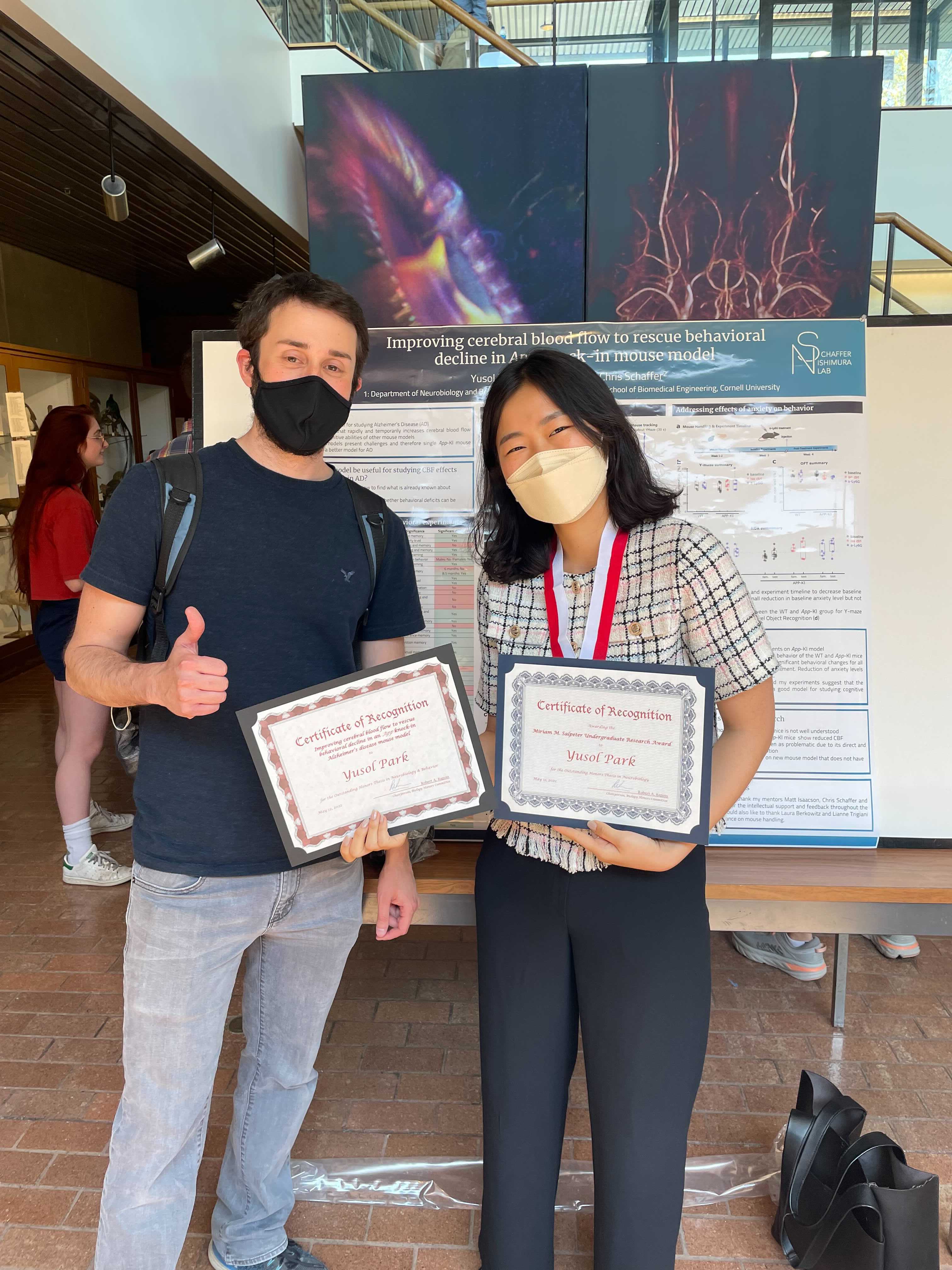Postdoc Matt Isaacson has just received a postdoctoral fellowship in Alzheimer's disease from the BrightFocus Foundation! The funded work will focus on imaging the neural mechanisms underlying the rescue of spatial learning and memory in AD model mice after treatment to restore cerebral blood flow. Congrats Matt!
Chris Schaffer is one of four Cornell faculty members awarded with the Kendall S. Carpenter Memorial Advising Award! The award honors professors and senior lecturers for sustained and distinguished contributions to undergraduate advising. Chris was praised for six years of service as a faculty-in-residence, and for making a "lasting impact” on undergraduates’ career trajectories by connecting them to conference and travel opportunities and offering guidance about next steps after graduation.
Congratulations to Chris Schaffer for winning an inaugural Sprout Award! The awarded project, proposed as a collaboration by Shaoyi Jiang and Chris Schaffer, aims to overcome the difficulty in targeting drugs to the brain due to the blood-brain barrier. Using retrovirus-like extracellular vesicles, the novel technique would be able to deliver new mRNA therapeutics into the brain simply using a traditional systemic injection.
In partial onset epilepsy, seizures arise focally in the brain and often propagate. Patients frequently become refractory to medical management, leaving neurosurgery, which can cause neurologic deficits, as a primary treatment. In the cortex, focal seizures spread through horizontal connections in layers II/III, suggesting that severing these connections could block seizures while preserving function. In this webinar hosted by the Therapeutic Laser Applications Technical Group, Dr. Chris Schaffer will discuss how, in a mouse model of focal epilepsy, sub-surface laser-produced cuts encircling the seizure focus attenuate propagation without behavioral impairment. Dr. Schaffer will present how they induced focal neocortical epilepsy in mice, created laser cuts surrounding the seizure focus, and electrophysiologically recorded at multiple locations for 3-8 months. With laser cuts, only 5% of seizures propagated to the distant electrodes, compared to 85% in control animals. These cuts produced a modest decrease in cortical blood flow that recovered and left a ~20-µm wide scar with minimal collateral damage. When placed over the motor cortex, the cuts did not cause notable deficits in a skilled reaching task. Femtosecond laser cuts hold promise as a novel neurosurgical approach for intractable focal cortical epilepsy. Check the talk here!

Yusol Park was awarded the 2021 Miriam M. Saltpeter Award for outstanding undergraduate honors thesis in neurobiology. Yusol worked with Matt Isaacson to develop her thesis, meticulously describing the behavioral deficits of the APP-Nl-G-F Alzhiemer's disease mouse model. Congrats Yusol!

MouseGoggles, the cutesy VR headset developed by Matt Isaacson and Hongyu Chang in the Schaffer-Nishimura and Ellwood Labs, has made its way to the Late Show with Stephen Colbert.
Move over Nature - being a 15-second gag on late night TV is the real scientific achievement.
Cornell's new Broadening Experiences in Scientific Training (BEST) program, funded by the National Institutes of Health, was profiled in Science Careers. One track in Cornell's BEST program focuses on science policy and is led by Chris Schaffer.
A blog post on the AAAS Member Central website describes the goals of Chris Schaffer's new science policy course, BME 4440 Science Policy Bootcamp: From Concept to Conclusion. This course is being offered for the first time this Fall, with an enrollment of about 20 undergraduate and graduate student scientists.
There are too few scientists who understand how they might contribute to public policy. In an effort to address this problem, Prof. Chris Schaffer and Dr. Catharine Clark were recently awarded a faculty fellowship from the Cornell Center of Engaged Learning and Research. This award will be used to support a new and innovative course entitled “Science Policy Bootcamp", slated for implementation in the Biomedical Engineering Department in Fall 2013. In addition to academic and administrative support from the Center of Engaged Learning and Research, Faculty Fellows will receive a stipend of $2500.
To celebrate the month of March as National Women's History Month, the Scientista Foundation at Cornell University wanted to highlight some of our favorite women in STEM. Many times the achievements of women are overshadowed by those of their male counterparts or credited to the work of their male colleagues. We wanted to take the time to celebrate, a scientist a day, their achievements and their lasting contributions to not only the scientific world, but also the world we live in today. Today's post is our first faculty interview video featuring Scientista's current faculty advisor, Dr. Nozomi Nishimura.
Link to the Facebook Post